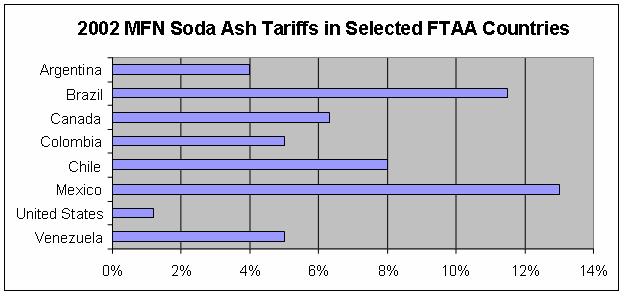|
Public
FTAA.soc/civ/97
June 13, 2003
Original: English
FTAA -
COMMITTEE OF GOVERNMENT REPRESENTATIVES ON THE PARTICIPATION OF
CIVIL SOCIETY
CONTRIBUTION IN RESPONSE TO THE OPEN AND ONGOING INVITATION
| Name(s): |
John Andrews, President |
| Organization(s): |
ANSAC |
| Country: |
U.S.A. |
May 2, 2003
Chair of the Committee of Government Representatives on the Participation of
Civil Society
Secretaria del Área de Libre Comercia de Las Américas (ALCA)
8 Oriente No 1006
Paseo San Francisco
Centro Histórico, Puebla 72000
Mexico
Via Electronic Mail: soc@ftaa-alca.com
Re: Request to the Negotiating Group on Market Access for Immediate FTAA-wide
Elimination of Soda Ash Tariffs (HTS 2836.20)
Dear Sir or Madam:
ANSAC welcomes the opportunity to respond to your Open Invitation to Civil
Society in FTAA Participating Countries and contribute its views to the
Committee of Government Representatives on the Participation of Civil Society.
ANSAC directs its comments to the Negotiating Group on Market Access and
respectfully requests reciprocal immediate tariff elimination on soda ash (also
known as “disodium carbonate” – HTS 2836.20) as a key objective of market access
negotiations for a Free Trade Area of the Americas (“FTAA”).
About ANSAC and the US Industry
ANSAC, based in Westport, Connecticut, is a risk-sharing and cost-sharing export
cooperative representing the American soda ash industry. The US industry
produces high-quality soda ash through a clean and environmentally-friendly
process that utilizes rich natural deposits located in the US states of Wyoming,
California, and Colorado. ANSAC is committed to providing a reliable supply of
high-quality soda ash at competitive prices to end-users worldwide, especially
downstream value-added industries such as glass manufacturing.
What is Soda Ash?
Soda ash is a basic chemical raw material required to manufacture other basic
commodities such as glass, detergents, and other chemical products. Soda is a
critical production input, accounting for roughly 60% of the material cost for
glass production and a high percentage of the material cost for detergent
manufacture. Because soda ash is a basic commodity required to make other basic
commodities, even the smallest price premiums (e.g., as little as a 2% price
increase) can significantly raise production costs for these value-added
downstream industries, costs that are passed on to other value-added
manufacturers and ultimately tens of millions of consumers.
Tariff Elimination Benefits All FTAA Countries
Reciprocal and immediate FTAA-wide elimination of soda ash tariffs would result
in widespread benefits for all member countries. Manufacturing in the
value-added glass, detergent and chemical industries stand to benefit directly,
resulting in the creation of tens of thousands of well-paying jobs. Competitive
raw material costs will also improve: (1) the competitive position of FTAA-member
country glass, detergent, and chemical exports in world markets; and (2) the
competitive position of domestic production in these same products relative to
non-FTAA imports such as those from Europe and Asia. Of course, the tens of
millions of Western Hemisphere consumers are the greatest beneficiary of
competitive prices for basic products such as detergents and glass containers.
High Hemispheric Tariffs Discourage Value-Added Manufacturing
Since small cost premiums (i.e., as little as 2%) significantly raise prices for
value-added manufacturing, high hemispheric soda ash tariffs constitute a
substantial barrier to the numerous downstream industries in FTAA countries that
utilize soda ash. 2002 MFN tariff rates on soda ash in selected FTAA countries
range from 1.2% in the United States to 11.5% in Argentina and Brazil. A
patchwork of preferential systems can significantly reduce the soda ash tariff
in intra-FTAA trade or eliminate it completely. For example, all soda ash
imports from FTAA countries enter the US duty-free under NAFTA and other
preferential trade programs. These preferences notwithstanding, a patchwork
system that keeps some rates high and others low is highly inefficient and
should be replaced with uniform duty-elimination. Notably, of the 34 FTAA
negotiating partners, only three countries – Brazil, the United States, and
Mexico – produce soda ash. Brazil and Mexico’s production represent far less
than a third of consumption of soda ash in each country.

Conclusion
Immediate reciprocal soda ash tariff elimination is a win-win for all FTAA-member
countries. It will directly direct benefit downstream value-added industries
that employ tens of thousands of workers and increase the competitiveness of
member country industry in world export markets. Ultimately, it will also
benefit the tens of millions of consumers of basic products that utilize soda
ash through lower prices.
ANSAC thanks you again for this opportunity to directly contribute to the FTAA
process.
Sincerely,
John Andrews
President
|
